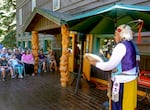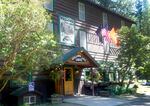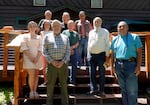
Nez Perce storyteller JR Spencer plays the drum and sings for an audience at the Wallowa Lake Lodge near Joseph, Ore., on July 1, 2023.
Antonio Sierra / OPB
Eight years ago, attorneys for the Wallowa Lake Lodge began taking bets against the survival of their new clients.
Dozens of community members had improbably bought the venerable lakeside hotel, avoiding an auction they feared would lead to a corporate takeover of a treasured piece of Wallowa Lake shoreline. The lawyers may have been willing to help set up the new business, but they weren’t confident a bunch of local investors with little hospitality experience could keep the lights on.
James Monteith, the lodge’s managing partner, didn’t learn about the wager until he recently reminded one of the attorneys that the lodge was celebrating its 100th year.
“‘Wow,’ he said, ‘We had a bet here that you wouldn’t make it three years. That you would implode,’” Monteith said.
The lodge is still intact, but what made it fit in with the rest of Wallowa County’s independent hotel owners and vendors has put it at odds with a national tourism industry that favors corporate vacation rentals and luxury hotels.
Wallowa County hasn’t been completely immune to these trends. Portland vacation rental business Vacasa recently bought its way into Wallowa County. In January, The New York Times published a story listing the county as one of the “most profitable winter vacation rentals” for investors. The primary source was a study done by Vacasa.
Locals who power the tourism industry, meanwhile, are finding it harder to live in the same place they work. Similar issues have arisen in other popular Oregon tourism spots, such as Bend and the North Coast. In a county where 1 in 4 residents is paying more than half their income toward rent, the rising price of housing is a growing concern for the community. When Gov. Tina Kotek visited Wallowa County in May, she spent part of her time talking with local leaders about the pressure vacation homes place on the local housing market.
The owners of the Wallowa Lake Lodge are well aware of that lack of affordability in tourist hotspots across the West for both visitors and residents. Keeping the rates at the lodge reasonable remains one of their top priorities, Monteith said.
Bruce Ham, a shareholder and a member of the company’s board of managers, said potential developers have long circled around Wallowa County. And while the Wallowa Lake Lodge looks beyond its centennial, the future of the county’s natural beauty — and how much of it is developed for tourists — is still an open question.

The Wallowa Lake Lodge near Joseph, Ore., on July 2, 2023.
Antonio Sierra / OPB
The campaign
Tucked in the far northeast corner of the state, Wallowa County sells itself with its natural beauty. In a county with the Eagle Cap Wilderness and Hells Canyon, Wallowa Lake is its centerpiece. Backdropped by the Wallowa Mountains, the 1,600-acre lake is surrounded by hotels and cabins, one of the most prominent being the Wallowa Lake Lodge.
For longtime residents and visitors, the lodge was as much a community hub as it was a tourist attraction. The basement bar offered a place to grab a beer and local schools would book the hotel for school plays. Even if a local never set foot in the lodge, its presence was a constant on the south end of the lake.
“I think a lot of us took it for granted,” Monteith said. “It was always here. It’s always gonna be here. And we came very close to losing it to something very different.”
After one of the lodge owners died, the hotel was set to be put on the auction block in 2015. Monteith said corporate hotel chains like Hilton and Hyatt sought to buy it. If it didn’t go to a hotel company, a housing developer wanted to tear the lodge down and build high-end, lakeside homes.
Not only would Wallowa County lose a local institution, there were concerns that access to the lake could be gated off and overdeveloped.
Monteith was among a small group of locals who rallied to buy the lodge to keep it in community hands. Still, he advised supporters and donors that there was little hope the effort would succeed. They weren’t deep pocketed and instead of courting a few wealthy investors, they were looking to find a group of people who were personally invested in the lodge and the lake.
But the small team also had a few factors working in their favor. The sellers liked the idea of maintaining the spirit of the lodge. And they found eager financial backers when they were pitching the idea to local investors, Monteith said.
“I told everybody we were doing this [and] that we’re probably not going to succeed,” he said. “People would get angry, and they’d say, ‘Damn it, take my money. It’s going to work.’”
The group managed to raise $300,000 in 10 days, allowing them to make a down payment on the property and cancel the auction. The investors fundraised the rest of the more than $2.7 million purchase price in the following months and Wallowa Lake Lodge LLC, now controlled by more than 100 shareholders, was born.
The new company joined the patchwork of locally owned motels, bed and breakfasts, and rental cabins that define most of the Wallowa County tourism industry. It’s a group that regularly talks about the balance between tourism and quality of life.
The Wallowa County ethos
Rob Klavins and Emily Cain have been on both sides of the tourism industry.
The married couple originally came to Wallowa County as visitors. Klavins works for conservation group Oregon Wild and when he first started making trips to the area, it was to work on wolf preservation. They would often stay at a bed and breakfast just outside of Enterprise, the Wallowa County seat and a town about 10 miles north of the lake.
The couple often “sort of joked” with the owners about buying the property, but the jokes became more serious when the owners offered to sell. Without previous experience in hospitality, Klavins and Cain became the owners and operators of Barking Mad Farm several years ago.
“Everybody loves when they’re on vacation,” Klavins said. “But people that come here for the first time, sometimes it just puts its hooks deep inside you and you just can’t leave. And we’re those kinds of people.”

Barking Mad Farm owners Rob Klavins, left, and Emily Cain talk about their kunekune pigs at their bed and breakfast near Enterprise, Ore., on June 30, 2023.
Antonio Sierra / OPB
The premise behind Barking Mad is that it’s both a working farm and a bed and breakfast. Many of the ingredients Cain uses in her breakfasts are sourced from food grown on the farm, whether that’s produce in the garden or meat from kunekune pigs that live on the property.
Klavins said the steady flow of tourism dollars generated by places like Barking Mad translates into services like health care, arts and culture, and restaurants.
About 1 million people visit Wallowa County each year, and according to a 2021 report, those tourists spend more than $30 million each year in the county. This is in a county that averages a little more than two people per square mile in an area twice the size of Rhode Island.
Despite the trends in tourism and the economy overall, Wallowa County businesses mostly belong to locals. Klavins noted that the Safeway and Subway in Enterprise are among the only chain businesses in the whole county.
The couple attributed the strength of Wallowa County’s local economy to its geography and infrastructure. Only two paved roads cross county lines and are open year round, and there are no commercial airports. In other words, vacationing in Wallowa County takes some work.
“I think that people don’t come here unless they have already bought into that ethos of wanting to be part of the community that’s here,” Cain said. “A big box corporation doesn’t really fit that well with that.”
Although he and his wife keep sustainability in mind with their work, Klavins said change is inevitable. While some in Wallowa County might be fighting to preserve a certain way of life, he said a lot has already changed since Euro-American settlers first colonized the area 170 years ago.
‘The land that we still belong to’
One of the many stories JR Spencer told to a small crowd at the Wallowa Lake Lodge’s centennial weekend this month was about a trip to the store.
He was buying garden mix and another customer set Spencer up for the punchline by asking him if he was planting a garden.
“I told him, ‘No, I’m buying my land back one bag at a time,’” he said to laughs from the audience. “‘Now, I’m keeping the receipt.’”
It’s a joke that frequently circulates throughout Indian Country and formed a small part of an hourlong performance that combined stand-up comedy, traditional storytelling, history lecture and concert.
It was a homecoming for Spencer, a member of the Nez Perce Tribe who usually performs on cruise ships on the Columbia and Snake rivers. While he lives on the Nez Perce Reservation in Idaho, Wallowa County belonged to the walwama band of Nez Perce until the U.S. Army forced them out in 1877.
Before his performance, Spencer said the tribe worried when the Wallowa Lake Lodge went up for sale.
“We were really afraid because we have a lot of natural resources here that today we still use,” he said. “There are still plants. There are still foods and medicines here in this area, just a stone’s throw away from where we’re sitting now, that potentially could have been obliterated if a large corporation came in and expanded operations.”
Monteith said conservation and building relationships with the tribe were a motivating factor for many investors. Coming to an agreement with the tribe on lakefront conservation easements was one of the first deals the new owners made after buying the property.
The Nez Perce tribal government is making an effort to reclaim its land in Wallowa County and conserve the natural resources that have been a part of Nez Perce life since time immemorial.
Aaron Miles Sr., a natural resources manager for the Nez Perce tribal government, said the tribe has bought property across the county over the past few decades. Much of that land, including the lodge’s easement, has been around the lake, where the tribe is looking to preserve plant life and restore sockeye salmon to the lake.
But the tribe has also looked beyond the lake’s immediate vicinity. In the early 1990s, the tribe acquired the valley where Chief Joseph was born, a property in the northeast corner of the county they refer to as the Precious Lands. More recently, the tribe bought a 77-acre ranch near the town of Joseph that could be used for housing or offices one day.
“It’s not just from an ecological or from a restoration perspective, but it’s our way as human beings to be able to reconnect to the land that we still belong to,” he said.
The lodge’s relationship with the Nez Perce remains a point of pride for the local owners as they begin to look past the centennial. Miles said the new owners of the lodge have made it easier to conserve by keeping much of its lakefront property undeveloped.
The lodge is changing, even as parts of the lake are preserved. Staff want to keep it relevant.

Shareholders and friends of the Wallowa Lake Lodge pose for a photo in front of the lodge's back deck near Joseph, Ore., on July 1, 2023. The group includes general manager Madeline Lau, far left, managing partner James Monteith, center, and board of managers member Bruce Ham, top left.
Antonio Sierra / OPB
Day-to-day activities are overseen by general manager Madeline Lau, who worked as an interpretive park ranger at Wallowa Lake State Park before she was hired at the lodge. She came to the lodge with no business experience, but she knew the hotel was underutilized compared to its glory years.
“The analogy that I use a lot is that it was like an heirloom,” she said. “People appreciated it, they treasured it, they wanted it to stick around, but they weren’t using it.”
The new management has brought more programming to the lodge and an effort to book more events like weddings during the winter months. Ideas for future projects include reviving the basement bar or adding a small meeting space for corporate retreats.
Still, a massive expansion is not in the works, especially since the conservation easement intentionally limits the lodge’s footprint. As much as the Wallowa Lake Lodge is in the hotel business, Monteith said it’s in the conservation business as well.
“We’re trying to be a business with those kinds of roots,” he said. “And it’s a much more fun way to practice business.”
Correction: The story originally misstated the size of Wallowa Lake. It has an area of 1,600 acres. OPB regrets the error.